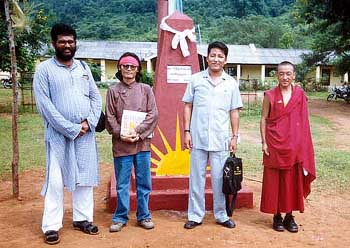'Non-Violent Action For Tibet' Workshop (12)
(Sept 30 - Oct 6, 2002. Bhandara, Maharashtra)

Workshop Trainers: Karma Yeshi, Sethu Das, Tenzin Tsundue and Tenzin Tsedup
"The great gift of freedom can never come to a people through charity.
We must win it before we can own it"
Rabindranath Tagore (1919)
Based on the feedback received from the workshop on 'Non-Violence And Social Action' held in Dharamsala and Derahdun last year, members of the Friends of Tibet (INDIA) and its advisors spent the first day of this year planning a series of workshops on 'Non-Violent Action' in India, Nepal and Bhutan. Then a three-month long workshop was organised by the Friends of Tibet (INDIA) on 'Non-Violent Action For Tibet' in three Noth-East states in India -- Arunachal Pradesh, West Bengal and Sikkim. The workshop team then decided to cover three Tibetan settlements in Central India. And the third phase of the workhsop led by Karma Yeshi la covered three Tibetan settlements -- Phuntsokling (Chandragiri, Orissa State), Phendeling (Mainpat, Chattisgarh State) and Norgyeling (Bhandara, Maharashtra State).
Worshop team was kept small for flexibility and the maximum effect. Karma Yeshi (Ex Vice-President, Tibetan Youth Congress), Sethu Das (President, Friends of Tibet INDIA), Tenzin Tsundue (General Secretary, Friends of Tibet INDIA) and Tenzin Tsedup (Former Political Prisoner) were the trainers for the one-month long workshop in Central India.
Members of the Friends of Tibet (INDIA) and its advisors thank all the organisations and individuals who made the workshop on 'Non-Violent Action For Tibet' a reality.
You may see photographs and read an interesting daily report on the Maharashtra workshop by Tenzin Tsundue at:
DAY 1 | DAY 2 | DAY 3 | DAY 4 | DAY 5 | DAY 6 | DAY 7
When we take an objective look at the Tibetan struggle today, there are certain realities which we must all agree. First of all, the Chinese are not going to walk away from Tibet because we tell them to. At the same time no other country will sacrifice their self-interest for the sake of Tibet. Even those who support the right of the Tibetan people to freedom can do very little until the Tibetans lead them into action. In short, without first making it absolutely clear what it is that the Tibetan people want and without consistent and continuous action on the part of the Tibetan people, we cannot hope to change the situation inside Tibet. At the moment, however, all is not yet lost. There is still hope for Tibet to be free and independent again.
Speeches / Presentations:
| 'Know Your Government' by Karma Yeshi | 'Mapping The Tibetan Freedom Movement' by Karma Yeshi | 'An Outsider's Point Of View' by Sethu Das | 'Individual As An Activist' by Tenzin Tsundue | 'Freedom Struggle Inside Tibet' by Tenzin Tsedup
List of Participants (Maharashtra): Tsering Wangdue, Tashi Wangdue, Pema Damdul, Tsering Choephel, Tenzin Dhargyal, Tamdin, Dolkar Lhamo, Tsering Norzom, Pempa Dolma, Tsomo, Ngawang, Pema Dorjee, Rhipak Palden, Kalsang Thinley, Kusang, Sonam Choedom, Lhamo Norzo, Tsering Lhadon, Lhamo, Pempa Chokpa, Tsering Dolma, Sonam Palzom, Ngawang, Tsering Phuntsok, Jampa Phuntsok, Lhakpa Dolma, Tsering Wangmo, Kusang Dochen, Tenzin Passang, Pema Rinchen, Tenzin Kunga, Rinzin Namgyal, Tenzin L, Choe Gyaltsen and Sonam Tsering.